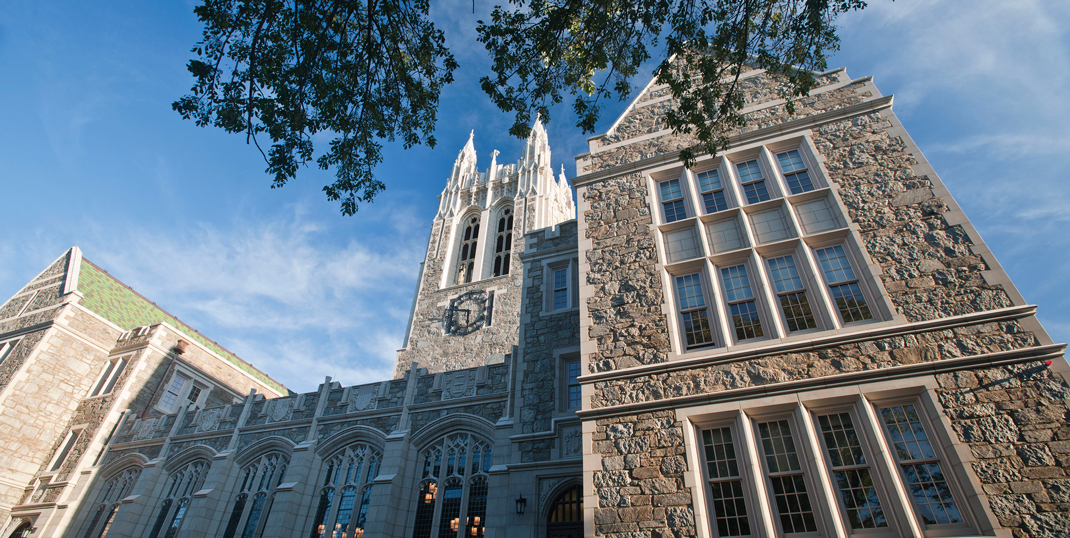Gary Wayne Gilbert
Speaking September 2 at a University Convocation reimagined for the pandemic era, Boston College’s senior leadership expressed confidence in the University’s ability to meet the challenges posed by COVID-19, along with other compelling educational, economic, and social issues—and to help others do so as well.
Reflecting on the past six months, University President William P. Leahy, S.J., said he had been “very impressed” with how the Boston College community had responded to the obstacles and hardships imposed by the pandemic: faculty and students working together remotely; offices and departments keeping essential services functioning; teams of planners collaborating to create a safe environment for students and employees alike; and faculty and staff volunteering to assist in BC’s COVID testing program.
Yet BC did not neglect its mission to reach out to the wider community, Fr. Leahy added, noting that BC Dining Services agreed to take on surplus food from vendors, and used it to donate some 150,000 meals to the needy in the Greater Boston area. When another, equally important need became evident, the University took action by donating thousands of diapers.
“We are not a narrow, isolated little group in Chestnut Hill,” said Fr. Leahy. “We know what is going on around us, and we seek to make a difference.”
Befitting the pandemic’s effect on routines and signature events at BC and elsewhere, University Convocation took place via Zoom. The format also was different: Rather than deliver prepared remarks, Fr. Leahy, along with Executive Vice President Michael Lochhead, and Provost and Dean of Faculties David Quigley, participated in a conversation with Vice President for Student Affairs Joy Moore, who posed questions and solicited comments on University matters but also national events and trends.
Causes for concern, in both the short and long term, are plentiful for the BC community, the speakers agreed: the pandemic and its impact on the economy as well as the nation’s health and wellbeing; continued unrest over long-simmering racial issues and violence in some communities; and a presidential election marked by severe political polarization.
“We all need to recognize that we are living in an extraordinary time,” said Fr. Leahy, “and Boston College, like all of higher education, is very much affected by what is happening. Clearly, there are changes afoot, and there also are risks that we must take on.”
“ We are not a narrow, isolated little group in Chestnut Hill. We know what is going on around us, and we seek to make a difference. ”
Looking at BC’s long history, which includes surviving the Great Depression and two world wars, puts current events in context, he said. Students, faculty, and staff should seek comfort and support, whether from inner faith or other sources, including conversation with friends.
“Don’t be isolated or bound by fear,” said Fr. Leahy. “Seek that advice and perspective. It can help tap inner resources we may not realize we had. We can handle this and move forward. We have done it before.”
Quigley agreed, recalling the Great Recession of 2008—which began at the time he started his tenure as dean of the Morrissey College of Arts and Sciences: “Somehow, we not only survived but emerged stronger than before. Then, we drew on the support from friends and colleagues, and that will be critical now and in the months ahead.”
Lochhead said he looked to his four children, two of whom are BC students, to maintain a sense of proportion. “It’s important to see the world from their vantage point, to understand the isolation, lack of connection, and other anxieties they feel, and to help them to sort out what’s important.”
The convocation speakers pointed to encouraging institutional developments. Quigley noted that of BC’s 49 new full-time faculty, 57 percent are women and 39 percent are AHANA, and that student assessment of remote learning last spring had been positive. Lochhead said the University’s strong financial position had enabled it to avoid lay-offs while also moving forward on some key strategic investments, including construction of the integrated sciences building.
“ [K]eep working for the good of the community and wider society. We want to be a place where solutions are brought forward. ”
Fr. Leahy, Quigley, and Lochhead said upholding BC’s Jesuit, Catholic legacy—balancing individual formation with a commitment to the wider world—will be more important than ever during the 2020-2021 academic year. This mission will be reflected in two new initiatives, the Forum for Racial Justice in America—a series of events to address issues of race and racism—and the Pine Manor Institute for Student Success, of which Moore is executive director, which will oversee outreach and academic support programs for underrepresented, first-generation, low-income students.
In that spirit, Fr. Leahy urged faculty, staff, and students to “keep working for the good of the community and wider society. We want to be a place where solutions are brought forward.”
Fittingly, Moore concluded the virtual event by reminding viewers to wear face masks and practice social distancing where appropriate, and to engage in a daily check for COVID symptoms.
Sean Smith | University Communications | September 2020




